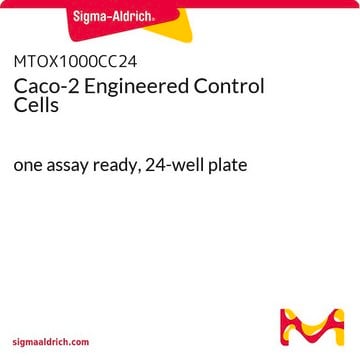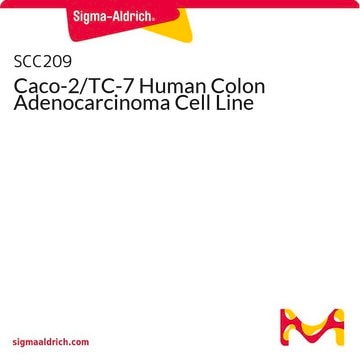MTOX1002P24
BCRP Knockout Caco-2 Cells
human cervix, Epithelial
Synonym(s):
BCRP Knockout C2BBe1 Cells
About This Item
Recommended Products
product name
BCRP Knockout Caco-2 Cells, one assay ready, 24 well plate
biological source
human colon
form
solid
morphology
Epthelial
technique(s)
drug transporter assay: suitable
permeability assay: suitable
application(s)
ADME/TOX
Looking for similar products? Visit Product Comparison Guide
General description
The three week production lead time begins on the Monday following a purchase, in the third week the plates are shipped on Tuesday for receipt on Wednesday or Thursday. As a biologic product that′s shipped at room temperature the cells must be processed immediately upon receipt.
Application
Transporter Function in Caco-2 Cells with Targeted P-Glycoprotein, MRP2 and BCRP Gene Knockout Using Zinc Finger Nucleases
Comparison of Function and Relative Transporter Protein Concentrations in Caco-2 Cells with Single and Double Knockouts of the ABCB1, ABCG2, and ABCC2 Genes
Caco-2 Transporter Knockout Cell Based Assays
Features and Benefits
- A functional knockout of the BCRP gene eliminates the reliance on chemical inhibitors to determine if a compound is an MDR1 substrate
- The 24 well Transwell format enables the BCRP knockout cells to be included in standard drug transporter protocols
- Human assay with no interference from animal inhibitors
- Overcome the limitations of RNAi and knockdown cell lines that arise from remaining transporter functionality
related product
Storage Class Code
13 - Non Combustible Solids
WGK
WGK 3
Flash Point(F)
Not applicable
Flash Point(C)
Not applicable
Certificates of Analysis (COA)
Search for Certificates of Analysis (COA) by entering the products Lot/Batch Number. Lot and Batch Numbers can be found on a product’s label following the words ‘Lot’ or ‘Batch’.
Already Own This Product?
Find documentation for the products that you have recently purchased in the Document Library.
Articles
Application note on Drug transport assays in a 96-well system using Millicell-96 System from Millipore.
Utilize these Caco-2 cell based assay tools for screening small molecule drug compounds prior to clinical studies and submission to regulatory agencies.
Utilize these Caco-2 cell based assay tools for screening small molecule drug compounds prior to clinical studies and submission to regulatory agencies.
Utilize these Caco-2 cell based assay tools for screening small molecule drug compounds prior to clinical studies and submission to regulatory agencies.
Our team of scientists has experience in all areas of research including Life Science, Material Science, Chemical Synthesis, Chromatography, Analytical and many others.
Contact Technical Service






